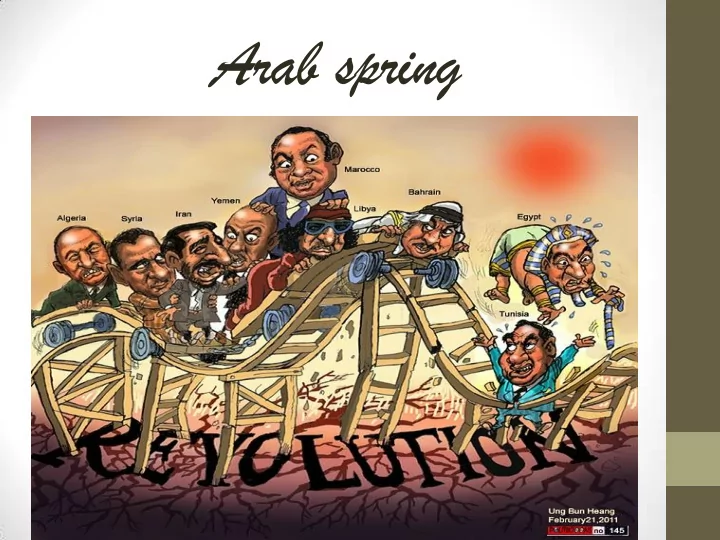

Arab spring
Arab spring map Middle East Protests
Recipe for a Revolution • Irremediable unjust or inept government seen as threat to country’s future • Elites alienated from government (military) • Broad based section of population, ethnic and religious groups and socioeconomic classes mobilization • International powers refusing to defend government or constrain it from using force
Recipe for a Revolution • Sultanic regimes in Arab world: • National leaders expand their personal power at the expense of formal institutions • No ideology • No purpose other than maintaining their personal authority • Economic development and education but funds are funneled to the sultan and their supporters • Jack Goldstone
Tunisia
Tunisia • Best educational system in Arab World • Large middle class • Strong labor movement • Limited freedom of expression and political parties • October 27 th In Tunisia, an Islamic party wins the election. • "Our vision of Islam is a moderate one and since 1981... we have declared that we accept democracy without any restrictions and we accept the decision of the people whether they come with us or against us.“ We accept the notion of citizenship as the basis of rights, so all citizens are equal whether they are Islamist or not Islamist.“ BBC • The Guardian • In the news
Egypt • Egypt is a heavyweight in Middle East diplomacy, in part because of its peace treaty with Israel, and as a key ally of the United States. • The country, has one of the largest and most sophisticated security forces in the Middle East. • Emergency Law since 1981 to combat terrorism after the assassination of Mr. Sadat. • In 2010, the government promised that it would only use the law to combat terrorism and drug trafficking, but terrorism was defined so broadly as to render that promise largely meaningless, according to human rights activists and political prisoners.
Ingredients for a Revolution • Grievances are economic, social, historic and deeply personal. • Egyptians often speak of their dignity, which many said has been wounded by Mr. Mubarak’s monopoly on power, his iron-fisted approach to security and corruption that has been allowed to fester. • It’s about claiming citizenship to one’s country • A Police State: Police officers direct traffic and investigate murders, but also monitor elections and issue birth and death certificates and passports. Every day, 60,000 Egyptians visit police stations, according to the Interior Ministry. In a large, impoverished nation, the services the police provide give them wide — and, critics say, unchecked — power.
Libya • The uprising in Libya instantly became violent when the Libyan government reacted harshly towards peaceful protests. On Feb 18, 2011, four days after the protests began, the country erupted into an armed conflict. • BBC
Libya • Libya has no system of political alliances, economic associations or national organizations • What is needed: • security, law and order • Trust between clans • Reconstruction of public administration • Strengthening civil society through political parties and education, open media and NGOs • Nation Building
Benjamin Barber on Gaddafi’s death? • “We know from the vicissitudes of the Arab spring elsewhere that revolution and democracy are two different species. The first can be won in a hurry, if at great cost, with the fleeing of a dictator (like Ben Ali in Tunisia) or the arrest of a dictator (like Mubarak in Egypt), or the killing of the tyrant (Gaddafi's fate). But democracy is another matter altogether, and requires long and patient labour in building civil society, forging a sense of citizenship, broadening education and inculcating habits of tolerance and respect for law that are generally not present in peoples who have lived so long under dictatorship. It is an irony of tyranny that it cultivates bad habits in its victims that can survive the death of tyrants and complicate the journey to freedom. The righteous mob that killed Gaddafi is not a model of justice and the rule of law .”
Syria
Good Government?
Women’s Rights? • Conflict: Rape as a weapon • Rewriting the Constitution: an opportunity? • Women’s literacy stands at just 58%, and only 23% of workers are women. • Current laws outlaw discrimination on the grounds of sex, but women are entitled to inherit only half as much as men. Husbands may divorce their wives in moments in front of a civil servant, but women endure lengthy court proceedings to do the same. A woman who remarries loses the right to custody of her children.
Far from equal
Recommend
More recommend